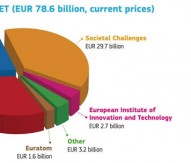
Commission adopts new rules for supporting RDI
The European Commission has adopted new rules that will facilitate the granting of aid measures by EU member states in support of research, development, and innovation activities.
The new state aid framework sets out the conditions under which member states can grant state aid to companies to carry out RDI activities. These new rules will assist EU member states in reaching the targets of the Europe 2020 Strategy for smart, sustainable and inclusive growth, while at the same time limiting distortions in the Single Market. They constitute a key component of the Commission’s State Aid Modernisation package.
Joaquín Almunia, European Commission Vice-President responsible for Competition Policy, said: “Research and innovation are key for growth and the competitiveness of our European economy. However, highly innovative projects often carry high risks and may not be implemented due to funding gaps. The new framework will help to overcome such market failures and foster a smart use of public resources for research, development, and innovation activities, in complement to private funding.
To boost economic growth, the EU aims to increase R&D spending to 3% of GDP. The EU’s RDI state aid rules are set out in two complementary texts. Firstly, the new General Block Exemption Regulation (GBER), which also covers other types of state aid, sets out the conditions under which state aid may be granted without prior notification to the Commission. Secondly, the new Framework sets out the criteria under which the Commission will assess RDI aid measures which have to be notified by member states because they have a higher potential for distorting competition.
The new state aid rules for RDI set out in the GBER and the RDI Framework include the following key features: greater flexibility for implementing RDI measures; higher aid levels permissible; and simplification and more legal certainty. Both sets of rules will enter into force on 1 July 2014.





